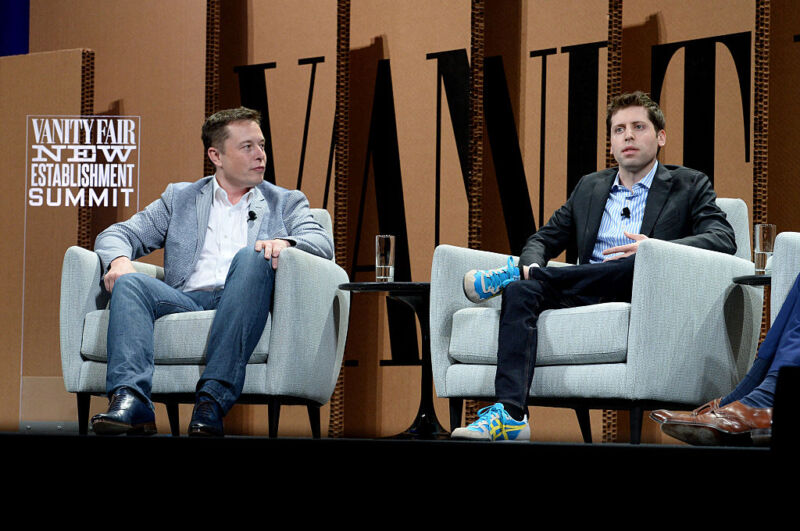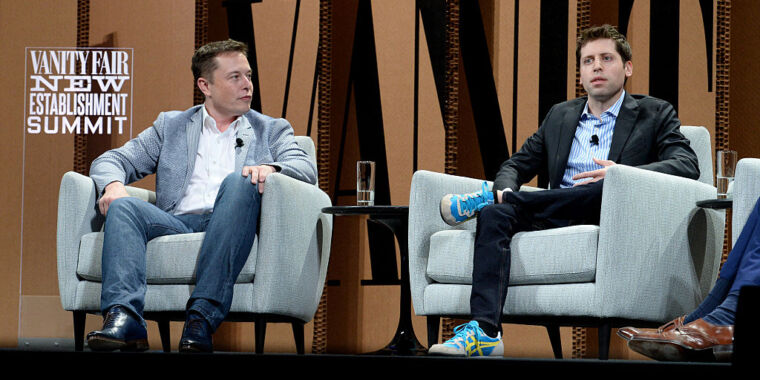
After withdrawing his lawsuit in June for unknown reasons, Elon Musk has revived a complaint accusing OpenAI and its CEO Sam Altman of fraudulently inducing Musk to contribute $44 million in seed funding by promising that OpenAI would always open-source its technology and prioritize serving the public good over profits as a permanent nonprofit.
Instead, Musk alleged that Altman and his co-conspirators—”preying on Musk’s humanitarian concern about the existential dangers posed by artificial intelligence”—always intended to “betray” these promises in pursuit of personal gains.
As OpenAI’s technology advanced toward artificial general intelligence (AGI) and strove to surpass human capabilities, “Altman set the bait and hooked Musk with sham altruism then flipped the script as the non-profit’s technology approached AGI and profits neared, mobilizing Defendants to turn OpenAI, Inc. into their personal piggy bank and OpenAI into a moneymaking bonanza, worth billions,” Musk’s complaint said.
Where Musk saw OpenAI as his chance to fund a meaningful rival to stop Google from controlling the most powerful AI, Altman and others “wished to launch a competitor to Google” and allegedly deceived Musk to do it. According to Musk:
The idea Altman sold Musk was that a non-profit, funded and backed by Musk, would attract world-class scientists, conduct leading AI research and development, and, as a meaningful counterweight to Google’s DeepMind in the race for Artificial General Intelligence (“AGI”), decentralize its technology by making it open source. Altman assured Musk that the non-profit structure guaranteed neutrality and a focus on safety and openness for the benefit of humanity, not shareholder value. But as it turns out, this was all hot-air philanthropy—the hook for Altman’s long con.
Without Musk’s involvement and funding during OpenAI’s “first five critical years,” Musk’s complaint said, “it is fair to say” that “there would have been no OpenAI.” And when Altman and others repeatedly approached Musk with plans to shift OpenAI to a for-profit model, Musk held strong to his morals, conditioning his ongoing contributions on OpenAI remaining a nonprofit and its tech largely remaining open source.
“Either go do something on your own or continue with OpenAI as a nonprofit,” Musk told Altman in 2018 when Altman tried to “recast the nonprofit as a moneymaking endeavor to bring in shareholders, sell equity, and raise capital.”
“I will no longer fund OpenAI until you have made a firm commitment to stay, or I’m just being a fool who is essentially providing free funding to a startup,” Musk said at the time. “Discussions are over.”
But discussions weren’t over. And now Musk seemingly does feel like a fool after OpenAI exclusively licensed GPT-4 and all “pre-AGI” technology to Microsoft in 2023, while putting up paywalls and “failing to publicly disclose the non-profit’s research and development, including details on GPT-4, GPT-4T, and GPT-4o’s architecture, hardware, training method, and training computation.” This excluded the public “from open usage of GPT-4 and related technology to advance Defendants and Microsoft’s own commercial interests,” Musk alleged.
Now Musk has revived his suit against OpenAI, asking the court to award maximum damages for OpenAI’s alleged fraud, contract breaches, false advertising, acts viewed as unfair to competition, and other violations.
He has also asked the court to determine a very technical question: whether OpenAI’s most recent models should be considered AGI and therefore Microsoft’s license voided. That’s the only way to ensure that a private corporation isn’t controlling OpenAI’s AGI models, which Musk repeatedly conditioned his financial contributions upon preventing.
Musk contributed considerable money and resources to launch and sustain OpenAI, Inc., which was done on the condition that the endeavor would be and remain a non-profit devoted to openly sharing its technology with the public and avoid concentrating its power in the hands of the few,” Musk’s complaint said. “Defendants knowingly and repeatedly accepted Musk’s contributions in order to develop AGI, with no intention of honoring those conditions once AGI was in reach. Case in point: GPT-4, GPT-4T, and GPT-4o are all closed source and shrouded in secrecy, while Defendants actively work to transform the non-profit into a thoroughly commercial business.
Musk wants Microsoft’s GPT-4 license voided
Musk also asked the court to null and void OpenAI’s exclusive license to Microsoft, or else determine “whether GPT-4, GPT-4T, GPT-4o, and other OpenAI next generation large language models constitute AGI and are thus excluded from Microsoft’s license.”
It’s clear that Musk considers these models to be AGI, and he’s alleged that Altman’s current control of OpenAI’s Board—after firing dissidents in 2023 whom Musk claimed tried to get Altman ousted for prioritizing profits over AI safety—gives Altman the power to obscure when OpenAI’s models constitute AGI.

